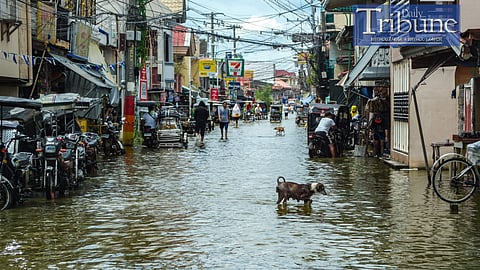
- NEWS
- the EDIT
- COMMENTARY
- BUSINESS
- LIFE
- SHOW
- ACTION
- GLOBAL GOALS
- SNAPS
- DYARYO TIRADA
- MORE

Climate change and education were among the top concerns of the Filipino youth, according to a study.
According to a U-Report Poll organized by the United Nations (UN), 3,000 young people in the Philippines expressed concerns on climate change and education.
Approximately 26 percent of young people in the country believe that “climate change and natural disasters” will be the biggest problem they will face in the future, while 23 percent are worried about not “being able to finish their education.”
“Health (physical and mental)” and “finding a job” are also major concerns, identified by 22 percent of the respondents.
Youth’s perspective on national issues
Young people said they see the lack of entry-level jobs (33 percent) and the current economic conditions (26 percent) as their two biggest obstacles to finding a job or starting a business in the future.
Other concerns include the lack of access to quality education (20 percent) and the disruption artificial intelligence (AI) technology has brought and could bring (18 percent).
These same issues surfaced when asked, in an open-ended question, what they would prioritize if they were President of the Philippines to build a better future.
Education, health, and the economy figured in most of their answers, asking the government to prioritize these critical areas.
Other national issues mentioned extensively include corruption, agriculture, poverty, and the environment.
What gives them hope
While youth are split on whether the future generation will be “worse off” or “better off” (44 percent vs. 37 percent), they do recognize the value that rapid technological innovations and democratic access to information can bring.
They also find hope in how young people now are getting more and more involved in global issues.
UN Philippines Resident Coordinator Gustavo Gonzalez lauded the commitment and contributions of children and young people in the Philippines.
"I want to thank every young person who is making their voice heard for an inclusive and sustainable world,” Gonzalez said.
“New generations are bringing a reinvigorated sense of solidarity and a compelling call for collective action. Both are essential to build the future we want," he he added.
Meanwhile, UNICEF Representative to the Philippines Oyunsaikhan Dendevnorov said that the U-Report findings revealed the “sobering, yet hopeful outlook young people have about their prospects for the future.”
“We should listen to what they have to say and work together to address these issues so that every child is cared for, protected, and given a fair chance in life,” Dendevnorov added.
U-Report a digital community, powered by UNICEF, designed for young people, by young people, where they can raise their voices and share opinions on topics that matter to them.
It empowers the youth to find out about issues that affect them and take action to influence their leaders.
